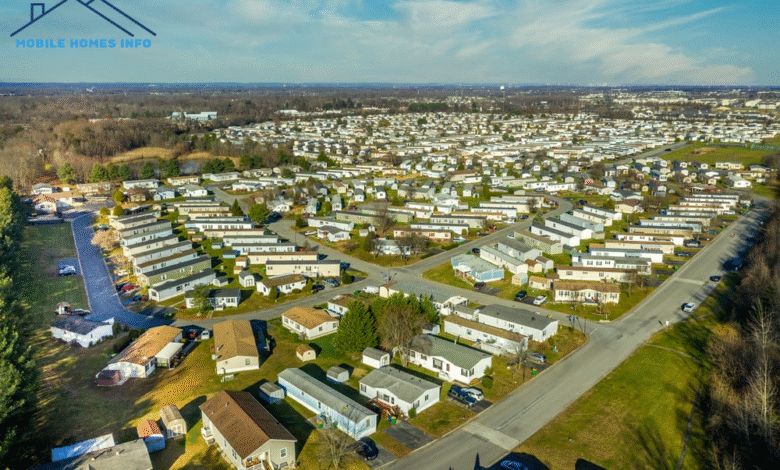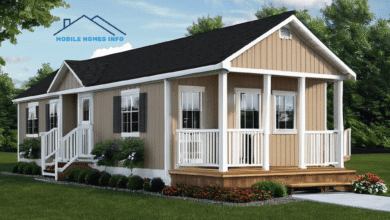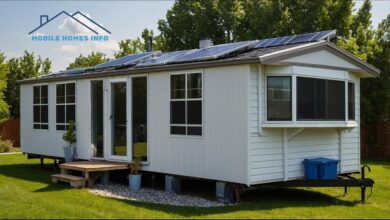Are Mobile Homes a Good Investment?

Introduction
The world of real estate investment is vast with numerous opportunities for both seasoned investors and newcomers. Investing in real estate has long been a popular avenue for generating wealth and achieving financial stability. The dream of homeownership and successful real estate investment is becoming more challenging as traditional housing prices skyrocket across many regions.
Among these challenges, mobile homes have gained attention as a viable, affordable and potentially lucrative option and more people are turning to mobile homes as a more affordable housing alternative. This guide explores everything you need to know about investing in mobile homes. From understanding what mobile homes are to evaluating their pros and cons, investment strategies, costs and future trends.
Table of Contents
1. What Are Mobile Homes?
Mobile homes, also known as manufactured homes are prefabricated structures built in a factory and transported to their destination. They fall into a broader category of manufactured housing, governed by the HUD Code (standards set by the U.S. Department of Housing and Urban Development).
The term “mobile home” technically applies to homes built before 1976, before these safety and design standards came into play. Any home manufactured after 1976 must meet specific HUD Code requirements for fire protection, plumbing, energy efficiency and more. Modern manufactured homes often resemble traditional homes and feel more like permanent residences than temporary structures.
2. Advantages of Investing in Mobile Homes
a. Affordability and Cost Overview
Mobile homes are generally more affordable than traditional homes making them an attractive option for first-time investors or those with limited capital. One of the most significant advantages of mobile homes is their affordability. On average, mobile homes cost significantly less than traditional site-built homes.
The cost of a mobile home can vary depending on the type, size, location and condition of the home. This ability to enter the market with less capital also provides opportunities to experiment with different strategies, such as flipping, renting or leasing without significant financial strain.
b. High Demand for Affordable Housing and Higher (ROI)
Mobile homes can offer an excellent return on investment, especially in areas with high demand for affordable housing driven by factors such as population growth, urbanization and economic challenges. As housing prices soar in many urban areas mobile homes provide an affordable alternative for individuals and families. This demand ensures a steady market for mobile home rentals contributing to consistent occupancy rates.
c. Steady Rental Income
Investing in mobile homes for rental purposes is another viable strategy. Mobile home rentals can provide a consistent income stream especially in areas with high demand for affordable housing. Given the lower cost of mobile homes compared to traditional single-family homes people can achieve favorable returns on their investment.
d. Lower Maintenance Costs
Mobile homes offer a cost-effective maintenance advantage due to their standardized construction and durable materials which adhere to HUD standards minimizing repair needs. Built in controlled environments, these homes ensure consistent quality, reducing the risk of defects.
They often feature durable materials like vinyl siding and metal roofing, which are less prone to weather damage. Additionally, their simplified systems make plumbing and electrical repairs more straightforward and affordable.
e. Flexibility in Location
One of the unique advantages of mobile homes is the ability to relocate them. Unlike traditional homes, which are fixed to a specific location, mobile homes can be moved to different areas, depending on market demand. This flexibility can be particularly beneficial for investors who want to take advantage of changes in local real estate markets.
3. Challenges of Investing in Mobile Homes
Mobile homes offer many benefits but there are also challenges to consider. Understanding issues like regulatory and maintenance concerns is crucial for minimizing risks and maximizing the advantages of owning a mobile home.
a. Depreciation
One of the biggest drawbacks of mobile home investments is depreciation. Unlike traditional real estate which tends to appreciate over time mobile homes generally lose value as they age. This is because they are often considered personal property rather than real property. As a result, mobile home values typically decrease which can impact an investor’s long-term profitability.
b. Financing Difficulties
Financing a mobile home purchase can be more challenging than securing a mortgage for a traditional home. Many lenders view mobile homes as personal property, which means they are subject to higher interest rates and less favorable loan terms. Additionally, there may be fewer loan options available for mobile home purchases, particularly for older homes.
c. Zoning and Regulatory Challenges
Mobile home investments can be complicated by zoning laws and regulations. In many areas, there are strict rules governing where mobile homes can be placed. These rules often limit the locations where mobile home parks or individual units can be established. Additionally, park rules and governance can create complexities for investors particularly when it comes to tenant management and park upkeep.
d. Limited Appreciation Potential
While mobile homes offer steady rental income, their potential for appreciation is limited. The value of a mobile home is primarily tied to the land it is on not the structure itself. This means that while the land may appreciate over time, the mobile home itself may not see significant increases in value.
e. Maintenance and Natural Disasters
Mobile homes are less durable than traditional homes, particularly when it comes to withstanding extreme weather conditions. In areas prone to hurricanes, tornadoes, or other natural disasters, mobile homes may be more vulnerable to damage. Investors must factor in the cost of insuring and maintaining these properties, especially in regions where severe weather is a concern.
4. Key Factors to Consider Before Investing
Investing in mobile homes requires careful planning. Start with these considerations:
a. Land Ownership vs. Leasing
Decide whether to purchase land for your mobile home or place it in a mobile home park. Land ownership increases costs but adds long-term value and resale potential. Meanwhile, placing a mobile home in a park involves paying lot rent, which impacts your returns.
b. Financing Options
Traditional mortgages typically aren’t available for mobile homes classified as personal property. Instead, you’ll encounter chattel loans, which often come with higher interest rates. However, if the mobile home is attached to owned land, conventional financing may be an option.
c. Location & Market Demand
The location of your mobile home matters immensely. Nearby amenities, employment opportunities and strong rental demand can significantly impact profitability.
d. Regulations & Zoning
Decide whether to purchase land for your mobile home or place it in a mobile home park. Land ownership increases costs but adds long-term value and resale potential. Meanwhile, placing a mobile home in a park involves paying lot rent, which impacts your returns.
Conclusion
Investing in mobile homes can provide strong returns with smart planning. By understanding the market, conducting thorough research and being mindful of costs mobile homes can offer reliable passive income and the chance to diversify your portfolio. Whether you’re buying a single-wide rental or managing a mobile home park, the key is to weigh the advantages and challenges.
Mobile home investments aren’t for everyone, but for those willing to explore this sector, the opportunities are there and growing.




